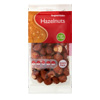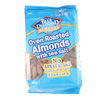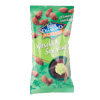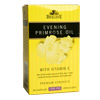Vitamin E
Vitamin E is one of the family of fat-soluble vitamins that include Vitamin A and Vitamin D.

Vitamin E is one of the family of fat-soluble vitamins that include Vitamin A and Vitamin D. Vitamin E helps acts as an antioxidant to protect your body from the effects of oxidative stress.
Where can I find Vitamin E?
As Vitamin E is a fat-soluble vitamin, you will find it in foods that also have some fat. Nuts and seeds are great places to find vitamin E especially almonds and sunflower seeds. You will also find vitamin E in oils like rapeseed and peanut oil. Wheatgerm is a great source of vitamin A.
Did you know?
The chemical name of vitamin E is ‘tocopherol’ which comes from two Greek words: tokos and pherein, which means ‘to bring forth children’.
Vitmain E – Benefits at a glance:
- Acts as an antioxidant to help protect your body from the effects of oxidative stress
How much Vitamin E do I need everyday?
The RDA or Recommended Daily Amount for Vitamin E is 12mg per day.
| Vitamin E in food (per 100g unless stated) | Need per 12mg day |
| 1 tablespoon Rapeseed Oil | 5.5mg |
| 1 tablespoon Peanut Oil | 3.7mg |
| Almonds | 23mg |
| Brazil Nuts | 7mg |
| Hazelnuts | 24mg |
| Peanuts | 10mg |
| 1 tablespoon Sunflower Seeds | 9mg |
| 1 tablespoon pine nuts | 3mg |
| 1 tablespoon Wheatgerm | 5.5mg |
How can I add more vitamin E?
- Use oils like Rapeseed or Peanut oil in cooking
- Snack on almonds, brazil nuts or hazelnuts
- Add wheatgerm to cereals, homemade breads and yoghurt
- Sprinkle sunflower seeds or pine nuts on salads or cereals
 SuperValu Hazelnuts
SuperValu Hazelnuts
SuperValu Hazelnuts 150g
 SuperValu Brazil Nuts
SuperValu Brazil Nuts
SuperValu Brazil Nuts 150g
 Blue Diamond Almonds Oven Roasted Almonds with Sea Salt
Blue Diamond Almonds Oven Roasted Almonds with Sea Salt
Blue Diamond Almonds Oven Roasted Almonds with Sea Salt
 Blue Diamond Almonds Wasabi Soy Sauce Flavour
Blue Diamond Almonds Wasabi Soy Sauce Flavour
Blue Diamond Almonds Wasabi Soy Sauce Flavour
 SuperValu Cashew Nuts
SuperValu Cashew Nuts
SuperValu Cashew Nuts 150g
 Beeline Evening Primrose Oil Capsules
Beeline Evening Primrose Oil Capsules
Beeline Evening Primrose Oil (EPO) is rich in Gammalinolenic Acid (GLA) an essential fatty acid which is an important element in balanced nutrition. Beeline EPO + Vitamin E Capsules supplement the diet with this unique polyunsaturated. Favoured by many women before and during menstruation, Evening Primrose Oil (EPO) is obtained from the seeds of the Evening Primrose plant .It contains a very unusual fatty acid called gamma linoleic acid (GLA). Linoleic Acid a component of many vegetable oils can be converted to GLA but many people can have difficulties with the conversion process. Factors inhibiting the conversion can be viruses such as colds and flus, stress, alcohol, saturated fats, aging and lacking certain nutrients in the diet. GLA provides the building blocks for the manufacture of certain hormone like substances called prostaglandins. These can have beneficial regulatory effects on the immune system, circulation and the menstrual cycle.